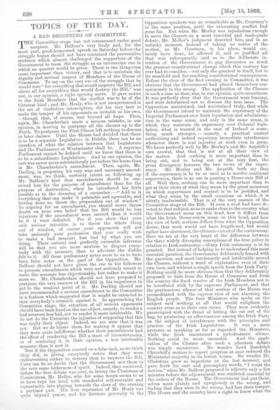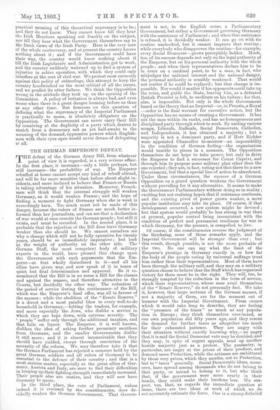TOPICS OF THE D.Y.
A BAD BEGINNING OF COMMITTEE. THE Committee stage has not commenced under good auspices. Mr. Balfour's very lively and, for the most part, good-humoured speech on Saturday before the struggle began should not have contained the provocative sentence which almost challenged the supporters of the Government to treat the struggle as an internecine one in which no quarter would be given. There is one thing even more important than victory, and that is to maintain the dignity and mutual respect of Members of the House of Commons. To say on the very eve of the struggle that he would vote" for everything that would improve the Bill, and above all for everything that would destroy the Bill," was not, in our opinion, a right opening move. It gave notice to the Irish Members that the conflict was to be of the bitterest kind ; and .Mr. Healy, who is not inexperienced in the art of vindictive interruption, did his very best to make the temper of his opponents as irritable as his own, —though that, of course, was beyond all hope. Then, again, Mr. Chamberlain made a serious mistake, in our opinion, in moving to postpone all the clauses up to the Ninth. To postpone the First Clause left nothing to discuss in later clauses. Until the House had decided that there is to be a separate Legislature in Dublin, there can be no question of what the relation between that Legislature and the Parliament at Westminster shall be. A supreme Parliament cannot be defined until we know that there is to be a subordinate Legislature. And in our opinion, the cart was never more ostentatiously put before the horse than in Mr. Chamberlain's amendment. Then, again, Mr. Darling, in proposing his very wise and necessary amend- ment, was, we think, unwisely intent on following up Mr. Balfour's hint that amendments should be con- ceived less for the purpose of amendment than for the purpose of destruction, when he introduced his little parable as to the dressing of a cucumber :—" Add to it everything that can make it palatable and agreeable, and having done so, throw the preparation out of window." In arguing for an amendment, you should never throw doubt on your own belief that the Bill would be less injurious if the amendment were carried, than it would be if it were defeated. For if you show that your only serious intention is to throw the whole thing out of window, of course your opponents will not take seriously your profession that you really wish to make a bad measure less bad by what you are doing. Their natural and perfectly excusable inference will be that you are more anxious to disgust every- body with the measure, than to alleviate the dislike felt to it. All these preliminary notes seem to us to have been false notes on the part of the Opposition. Mr. Balfour should not have given the cue to his followers to propose amendments which were not seriously meant to make the measure less objectionable, but rather to make it more so. Mr. Chamberlain should not have proposed to postpone the very essence of the Bill in his impatience to get to the weakest point of it. Mr. Darling should not have recommended a serious amendment to the Committee in a fashion which suggested that it might be intended to turn everybody's stomach against it. In approaching the Committee stage, the attention of all serious opponents should have been fixed on the one object, namely, to render a bad measure less bad, not to render it more intolerable. We do not do the Unionists the injustice of supposing that this was really their object. Indeed, we are sure that it was not. But we do blame them for making it appear that they were quite indifferent whether their amendments had the effect of rendering the Bill a mass of inconsistencies, or of rendering it, in their opinion, a less intolerable measure than it now is. But if the Opposition started on a false tack, as we think they did, in giving everybody notice that they were endeavouring rather to destroy than to improve the Bill, t'iere can be no doubt that the Government met them in the very same bitterness of spirit. Indeed, they contrived, before the first debate was over, to betray the Chairman of Committees, Mr. Mellor, who for some hours seems to us to have kept his head with wonderful self-restraint and equanimity, into playing towards the close of the evening a partisan part. His firm repression of Mr. Healy was quite beyond praise, and his fairness generally to the Opposition speakers was as remarkable as Mr. Courtney's in the same position, until the exhausting conflict had gone far. But when Mr. Morley was injudicious enough to move the Closure on a most essential and inadequate debate, Mr. Mellor's judgment deserted him, and in an unlucky moment, instead of taking no notice of the motion, as Mr. Courtney, in his place, would cer- tainly have done, he allowed it, and so justified all that was subsequently said as to the deliberate in- tention of the Government to gag discussion on much the greatest constitutional change which this century has ever had to consider,—not only the greatest in itself, but in its manifold and far-reaching constitutional consequences. Before the close of the first evening in Committee, it was obvious that the Government had placed themselves con- spicuously in the wrong. The application of the Closure in such a case as that, was, in our opinion, quite monstrous. It was perfectly clear that the Government were fencing, and were determined not to discuss the true issue. The Opposition maintained, and maintained truly, that while the Government intend to maintain the supremacy of the Imperial Parliament over Irish legislation and administra- tion in the same sense, and only in the same sense, in which they maintain its supremacy over Colonial legis- lation, what is wanted in the case of Ireland is some- thing much stronger, — namely, a practical control authorising and indeed requiring immediate interference whenever there is real injustice at work even in germ. We know perfectly well, by Mr. Morley's and Mr. Asquith's own avowal, that that is not at all their view of the matter. And nothing is more important than to bring out, and to bring out at the very first, the great divergence between the two views of the supre- macy. Mr. Morley and Mr. Asquith both say that if the supremacy is to be so used as to involve continual supervision, there is no use in passing a Home-rule Bill at all. Well then, nothing can be more important than to get at their views of what they mean by the great occasions on which supervision and control is to be justified, and what they mean by the small occasions on which it is utterly inadmissible. That is of the very essence of the Committee stage of the Bill. If even a week had been de- voted to that subject, so as to make clear to the country what the Government mean on this head, how it differs from what the Irish Home-rulers mean on this head, and how the view of both sections differs from what the Opposition desire, that week would not have lengthened, but would rather have shortened, the ultimate extent of the controversy. Here we are at the very heart of the difference between the three widely diverging conceptions of the true policy in relation to Irish autonomy,—if any Irish autonomy is to be granted. But instead of helping us to understand this most essential question, the Government deliberately fenced with the question, and most intolerantly and intolerably moved the Closure, without a word of explanation even of their own view, and without a single speech from the Irish Party. Nothing could be more obvious than that they deliberately proposed to hide from the House of Commons and from the country the fixed resolve of the Irish Members not to be interfered with by the supreme Parliament, and that the pertinacious silence of that section of the House was premeditated with the express view of not alarming the English people. The four Ministers who spoke on the subject said nothing at all that would enlighten the country even as to their own views. They were evidently preoccupied with the dread of letting the cat out of the bag, by producing an effervescence among the Irish Party on the subject of interference with the principles and practice of the Irish Legislature. It was a mere pretence at speaking so far as regarded the Ministers, while the Irish maintained a melodramatic silence. Nothing- could be more uncandid. And the appli- cation of the Closure after such a phantom debate was simply monstrous. No wonder Lord Randolph Churchill's motion to report progress at once reduced the Ministerial majority to its lowest terms. No wonder Mr. Gladstone grew so imperious at the last moment, and gave forth his curt and peremptory words, " I resist the motion," when Mr. Balfour proposed to adjourn only a few minutes before the adjournment was rendered essential by the orders of the House. The Government had put them selves most plainly and egregiously in the wrong, and feeling that they were in the wrong, had lost their temper. The House and the country have a right to know what the practical meaning of this theoretical supremacy is to be ; and they do not know. They cannot know till they hear the Irish Members speaking out frankly on the subject, nor till they hear what the Government themselves say to the frank views of the Irish Party. Here is the very core of the whole controversy, and at present the country knows nothing about it ; and if the Government could have their way, the country would know nothing about it till the Irish Legislature and Administration got to work, and the country suddenly wakened up to find a system of injustice in active operation, with which they could only interfere at the cost of civil war. We protest most earnestly against this policy of subterfuge, this attempt to keep the country hoodwinked on the most critical of all the issues, and we predict its utter failure. We think the Opposition wrong in the attitude they took up on the opening of the Committee. A policy of irritation is always bad, and even worse when there is a great danger looming before us than at any other time. But firmness on this question of defining what the supremacy of the Imperial Parliament is practically to mean, is absolutely obligatory on the Opposition. The Government can never carry their Bill by conniving at the duplicity of a party which desires to snatch from a democracy not as yet half-awake to the meaning of the demand, oppressive powers which English- men with their eyes open would never dream of delegating at, all.



































 Previous page
Previous page